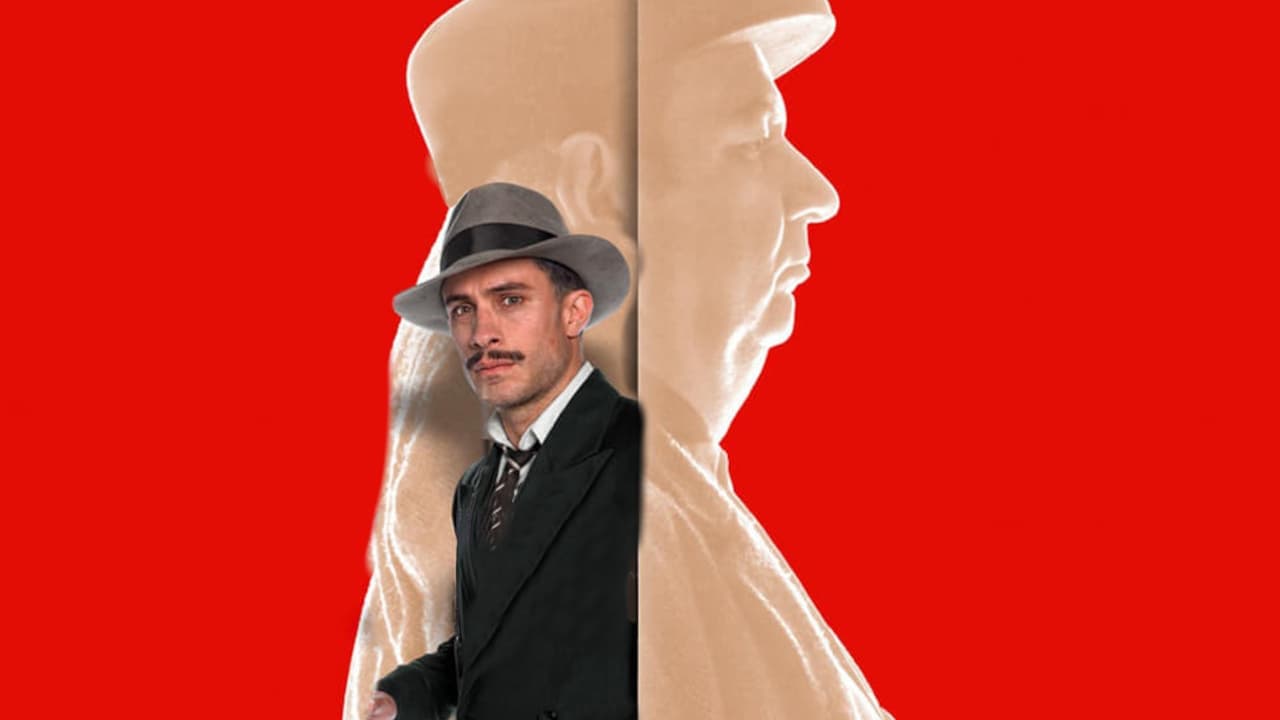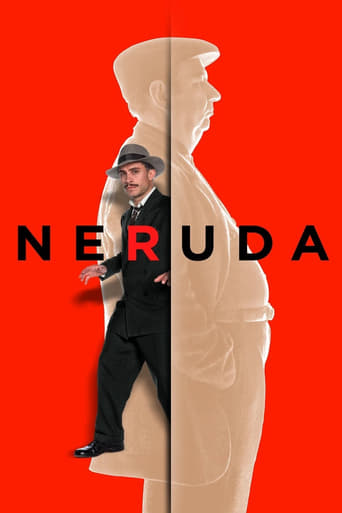

The greatest movie ever made..!
... View MoreLet's be realistic.
... View MoreClever and entertaining enough to recommend even to members of the 1%
... View MoreThe storyline feels a little thin and moth-eaten in parts but this sequel is plenty of fun.
... View MoreIn post war Chile, Communist poet Senator Pablo Neruda (Luis Gnecco) enrages the political establishment. He decides to go into hiding as Óscar Peluchonneau (Gael García Bernal) leads a large police dragnet to arrest him. Soon, anti-communist repression takes hold in the country and many are imprisoned.This has too much of an artistic flair. I get the connection with a poet protagonist. I would like to understand the political climate at the beginning. Neruda talks about strikes. It would be helpful to see more of the anti-union brutality. It would set the stage for his initial escape. Not everybody knows the history or even who Augusto Pinochet is. I like the Captain Ahab aspect of Peluchonneau. It would be good to have less artistic flair. I want less literary exposition and more intense thrills. I like the turn as the political roundups take its toll and the darker character descend. There is a more intense take on this story but I'm not completely opposed to this artistic rendering.
... View MoreMy knowledge about author Pablo Neruda was limited to a book of poems I read as a teenager. So, due to my little experience with his work, the film Neruda was a revelation from the beginning to the end, illustrating me about the "secret life" of the famous writer and his life as a political dissident. Despite that unexpected premise, screenwriter Guillermo Calderón conciliates Senator Neruda with artist Neruda, making the film begin as a political thriller which gradually becomes a dreamlike poem in order to satisfactorily conclude on a simultaneously magical and realistic ending. Calderón's best trick is changing the main character without fracturing the narrative; the first half is focused on the ideological evolution from Neruda, one of the few Senators who were against the influence the United States was making over the President of Chile; then, his political downfall comes, and the narrative focus switches to Óscar Peluchonneau, a relentless policeman who chases him, displaying his turbulent psychology and "daddy issues" which motivated his mission, as well as the strange connection he develops with his prey. That's a precarious balance which is very well handled by Calderón and director Pablo Larraín, supported by the excellent performances from Luis Gnecco and Gael García Bernal as Neruda and Peluchonneau (respectively). The quantity and variety of themes examined in Neruda defy the simple structure of any biopic; however, the result was satisfactorily complex and ambitious, without losing the didactic qualities of a good History lesson (whose fidelity regarding the true events I'm not interested in finding out). In conclusion, Neruda is a brilliant film, and a fascinating look into the hidden side of a man whose legacy transcends the poetry for which he's remembered. I just wish all the biopics to be as creative and intelligent as this one (yes, starting by the recent Jackie, also directed by Larraín).
... View More"Neruda" (2016 release from Chile; 107 min.) is a movie about the hunt for Communist activist, poet and Senator Pablo Neruda in 1948. As the movie opens, we see Neruda in an argument with another Chilean Senator after Neruda allegedly has insulted Chilean President Gabriele Gonzalez. It's not long before word reaches Neruda that he is about to be impeached, and he has no choice but to go underground and hide. The President appoint a special prosecutor, Oscar Peluchonneau, "to catch Neruda and to humiliate him", in the President's words. At this point we are less than 15 min. into the movie, but to tell you more of the plot would spoil your viewing experience, you'll just have to see for yourself how it all plays out.Couple of comments: this is another movie from Chilean director Pablo Larrain, whose other film, "Jackie" starring Natalie Portman, is still in the theaters. Before that, Larrain brought us another political movie, the Oscar-nominated "No". Here Larrain takes a look at the year or so that Neruda, "the most important Communist in the world" someone comments, goes into hiding while the Communist Party is being outlawed in Chile. In that sense, this is NOT a bio-pic about Pablo Neruda: we do not get any background as to how Neruda became so popular or what formed his political ideas or his poetry. The movie comes to us with a voice over from the special prosecutor Oscar Peluchonneau, as he gives his perspective on Neruda. This is quite helpful actually, as we understand better what Neruda was able to accomplish with his writing: they were not just poems of love, but many struggling people recognized themselves in these writing, and hence they became "poems of rage and political uncertainty". Kudos to Louis Gnecco for his performance as Neruda (not to mention the uncanny physical resemblance). Last but not least, the movie's photography is pure eye-candy and in a way the movie is unintentionally one long tourist ad for Chile (in particular the parts that play out in southern Chile)."Neruda" premiered to universal acclaim at last year's Cannes Film Festival. It finally opened at my local art-house theater here in Cincinnati this weekend. The Sunday early evening screening where I saw this at was attended nicely, I am happy to report. How this movie did not get nominated for the Best Foreign Language Movie Oscar is beyond me. (There is a good reason why "Neruda" currently holds a 95% rating on Rotten Tomatoes.) All that aside, if you are in the mood for an intelligent politically flavored movie about one of Chile's best known politicians and poets, you cannot go wrong with this, be it in the theater, on Amazon Instant Video or eventually on DVD/Blu-ray. "Neruda" is HIGHLY RECOMMENDED!
... View More"I am convinced there will be mutual understanding among human beings . . . in spite of all the suffering, the blood, the broken glass" - Pablo Neruda, Memoirs If the genre known as bio-pic has evolved into a predictable linear account of a well-known person's life, Chilean director Pablo Larraín has turned the genre on its head in Neruda, his impressionist and surreal examination of one year in the life of the great Chilean poet Pablo Neruda. Written by Guillermo Calderón, the film continues Larrain's exploration of recent Chilean history, following on the heels of "Tony Manero" (2008), "Post Mortem" (2010), and "No" (2012), works concerned with the effects of U.S.-backed dictator Augusto Pinochet. Neruda centers on the period 1948-49 after President Gonzalez Videla (Alberto Castro, "The Club") banned communism from Chile and issued a warrant for Neruda's arrest after he publicly protested the government's imprisonment of Communist mine workers.Winner of the Nobel Prize for Literature in 1971, Neruda, called "the greatest poet of the 20th century in any language" by author Gabriel Garcia Marquez, was a member of the Chilean Communist Party and served as a Senator as well as in several diplomatic posts. Luis Gnecco ("Much Ado About Nothing") portrays Neruda as a corpulent middle-aged man full of contradictions – hero of the Communist working class and an admirer of Joseph Stalin, an outspoken enemy of the state and a man of exuberance and love of life, given to attending orgies, hanging out in brothels, and reciting his poetry to prostitutes and drag queens. In one telling scene, Neruda is dressed up as Lawrence of Arabia, reciting "Tonight I Can Write the Saddest Lines," one of his most popular poems.In the film's flamboyant opening, attacks on Neruda by his colleagues in the Senate are delivered in a spacious Senate chamber which doubles as a men's bathroom, suggesting that the rest of the film should not be taken literally. Referred to as "Emperor Caligula," he is told that "Communists hate to work. They'd rather burn churches. It makes them feel alive," Neruda defiantly fends off attacks. The film is narrated by a disembodied voice that we later learn is that of mustachioed police detective Oscar Peluchonneau (Gael Garcia Bernal, "No"), the son of a prostitute, ordered by his superiors to apprehend Neruda and humiliate him. As the poet moves around with the assistance of Communist friends, he leaves behind pulp detective novels for Oscar to find, a mocking trail of clues that somehow forge an unspoken bond between the hunter and the hunted.As it unfolds, the film is as much about the policeman as it is about Neruda, both of whose lives are linked by a dark and soulful poetry. Neruda's wife, Delia del Carril (Mercedes Morán, "Chiametemi Francesco – Il Papa della gente"), tells the inspector that he exists solely as a supporting character in one of Pablo's stories: "He created you as the guard of an imaginary border. He thinks about you thinking about him." This does not sit well with Oscar who pictures himself as a central character in the nation's history, not playing a secondary role in a fictional story. Hidden for months in the basement of a house in Valparaiso, Pablo is turned back when he and his wife attempt to cross the border into Argentina because his name does not match the birth name on his passport, Ricardo Reyes Basoalto.Protected by friends from the pursuing police, the couple is forced to move into a small apartment where Delia, a well-to-do Argentinean, complains about having to clean. When someone gives her rubber gloves; she asserts that, "hygiene is a bourgeois value." Though confined under the watchful eye of Jara (Michael Silva), a Communist Party member who becomes one of Neruda's primary handlers, Neruda still manages to sneak out to a brothel dressed as a priest and presents himself in drag at a later visit after Peluchonneau searches the premises in vain. To put events in context, Larraín shows us leftists being rounded up and sent to a prison camp run by a young military officer named Augusto Pinochet. There is also a memorable scene in which Neruda dresses in a white suit and hat pretending to be a Central American visitor.Neruda shows his connection to ordinary Chileans as he hugs a street beggar and gives her his white jacket and also reassures a hotel maid that the revolution will end her long hours of hard work and low pay. The final phase of the film is the most revealing as Neruda attempts to escape from Chile on horseback over a mountain pass in the Andes near Maihue Lake into Argentina. Still being pursued on motorcycle by the determined, almost comical, police inspector, whose love-hate relationship with his prey has become obsessive, Neruda must call upon all of his inner resources to keep going to freedom. As Oscar's motorcycle runs out of gas, the illusion that will die on the mountain is reborn as poetic truth.
... View More